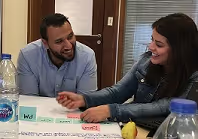From training to action: Moving into Phase II of PM+

In our previous post, we wrote about the PM+ master training in Cairo, Egypt, where nine international humanitarian agencies and two consultants came together to learn, share and discuss the importance of PM+, a trans-diagnostic intervention designed for low-resource settings.
What makes PM+ a scalable intervention that can be used in humanitarian contexts is that it can be delivered by paraprofessionals (high school graduates with no mental health experience), using the principle of task shifting/task sharing for people in communities affected by any kind of adversity (e.g. violence, disasters), not just focusing on a single kind of adversity.
As we move into the second phase of the project, the aforementioned organisations have taken their new knowledge and skills back home and have started to disseminate the training to staff within their organisations and develop implementation plans.
One of the organisations, Action Against Hunger (ACF), started by conducting two trainings; one for headquarters-based staff and one for future program managers and psychologists, who will help to manage and supervise future PM+ helpers at ACF field locations. They built this foundation to enable them to train local community-based organisations throughout Iraq later this year. This specific project will be in collaboration with the Iraq Ministry of Health as part of a larger project to increase access to mental health care by rolling out the mental health gap action programme (mhGAP) intervention guide. ACF also plans to train staff in four countries across sub-Saharan Africa in early 2019: Nigeria, Chad, Cameroon and Niger.
In addition, the International Rescue Committee (IRC) trained their mental health and psychosocial support staff in Jordan who are responsible for programming inside Syria. They plan to train psychologists and Psychosocial Support Workers (PSW) from IRC and partner organisations who work at health facilities and in mobile community teams throughout Southern Syria.

The seven other organizations who attended the training in Cairo have also been busy conducting supervisory and staff trainings throughout the globe while preparing to start providing PM+ sessions in Colombia, Ethiopia, Zimbabwe, Ecuador and the list goes on.
As we move into the second phase of the project and scaling up PM+ becomes a reality, I can’t help but think about the thousands of individuals who will now have access to mental health services to alleviate their symptoms in places where mental health services were previously non-existent or extremely limited.
Author: Ashley Nemiro, Project Consultant

Stay updated
Sign up for our newsletter to receive regular updates on resources, news, and insights like this. Don’t miss out on important information that can help you stay informed and engaged.
Explore Elrha
Learn more about our mission, the organisations we support, and the resources we provide to drive research and innovation in humanitarian response.


.png)